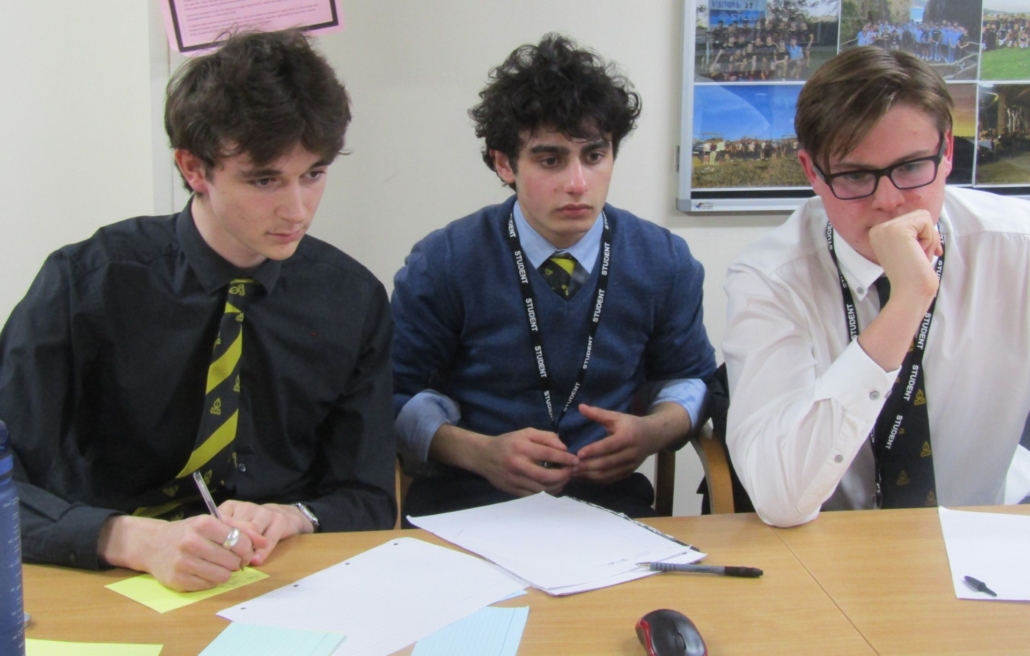A New Season’s Debating
ESU Mace and UCL Winter Cup Competitions
Mace Team listening
ESU Mace
As usual our first debating competition of the school year was the opening round of the ESU Mace, held online. This year only two of the six schools in our heat would progress to the second round. The first motion of the night, “This House Believes that environmental campaigning should focus on changing government policy rather than individual behaviours”, was proposed by St Mark’s West Essex Catholic School, whose case rested primarily on the argument that governments exert greater power and authority than individuals, for instance by instigating the decarbonisation of steel mills and being able to enforce policies such as low emission zones. Their opponents, Herts & Essex, speaking more fluently, pointed out that the imposition of policies may cause a public backlash, whereas changing individuals’ behaviours can improve their wellbeing and/or save them money. Plenty of Points of Information were raised, but neither side mentioned environmental campaigners, suggesting that they had both missed part of the point of the motion.
Next Freman College advocated that esports & gaming should not be treated as real sports on the grounds that they do not require physical exertion, encourage violent behaviour and lack a sense of history. In response St Albans High School for Girls pointed out that elite gamers put in hours of practice and need endurance. They also argued that esports provide entertainment and will become increasingly lucrative as their popularity grows, as well as commenting on the risks involved in Rugby and American Football. The Opposition speeches covered a wider range of arguments and were delivered with greater fluency and confidence.
In the third debate TBSHS proposed that “This House Would broadcast court cases in the British justice system. Our intended opponents, Bishop’s Stortford College, had withdrawn at short notice because of illness, so the Herts & Essex team volunteered to act as a ‘swing’ team. Opening the debate, Aidan Quinn produced the best introduction of the night, with clear signposting of the arguments for the motion, followed by an explanation that while we wished to go beyond the current very limited transmission of court proceeding, not all cases would broadcast and those that were would appear on a dedicated BBC channel. He went on to explain the benefits to society in terms of transparency, access and education and said that giving people of all ages the opportunity to become more familiar with what goes on in court would demystify legal processes. The first opposer claimed that people remained ignorant about what goes on in court because they do not care, complained that Aidan’s proposals turned court cases into entertainment and argued that televising cases would lead to much greater abuse of defendants and plaintiffs on social media. In response Luca Ollandini explained that being able to observe a whole case gives a more complete, balanced view of it than highlights produced by journalists and dismissed comparisons with broadcasts of American court cases by drawing attention to the differences between US and UK legal systems. Extending our case, he went on to argue that greater exposure would make lawyers more accountable, drawing on reports of the improvement of their behaviour when observed by law students and the benefits of higher standards of advocacy.
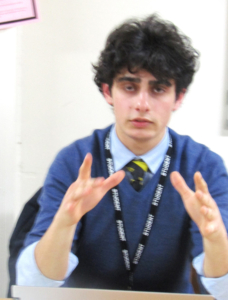
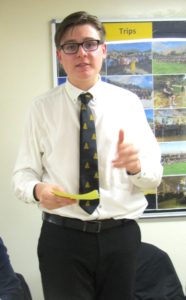
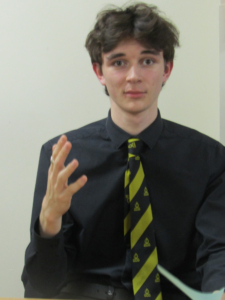
Luca Aidan Alex
The second Opposition speaker stressed the potential threat to personal privacy, citing the case of Jonny Depp and Amber Heard. This point was neatly countered by Alex Banhidai’s excellent summary speech, where he explained why the importance of justice being widely seen to be done outweighed such concerns, as well as dealing effectively with points raised in the floor debate. In a very well-paced speech with plenty of expression, Alex managed to show how his side’s speeches added up to a clear coherent case which defeated that of the Opposition.
After quite a short break the chief judge announced that TBSHS and St Albans Girls would go through to Round 2. In a very useful feedback session afterwards, she praised our teamwork and speech structure, especially the strength of the conclusions of each of them, as well as the way opposing arguments were addressed and the confident manner of all three speakers.
UCL Schools’ Winter Cup
The season’s first in-person debating competition rounded off a busy fortnight for TBSHS speakers, who provided two of the 52 teams to contest the UCL Winter Cup. Sixteen schools, including Westminster & St Paul’s Girls, attended and there were several members of the England Schools’ squad taking part, so Sixth Formers Henry Davis & Lewis Ng and Year 11 students J J Sathan & Kashan Johar knew that a demanding day’s debating lay ahead.
Both our teams were drawn to open the first-round debate “This House Would ban all further research in gene alteration”. Henry & Lewis put forward mostly ethical arguments and pointed out the religious objections to gene alteration. Although the moral aspects of their case went down well with the judge, she awarded them third place, a result matched by Kashan & J J in a room with three teams from independent schools. Teams with similar first-round results are drawn together in Round 2, so I was able to watch both TBSHS teams closing the next debate for their respective sides of the motion “This House Believes that the rise of social media platforms focusing on short-form content (e.g., Twitter & TikTok) has done more harm than good”. Lewis, the first of our speakers, began by pointing out to the Opposition that short form platforms are seen as providers of entertainment, which makes users less wary of their content, and therefore more vulnerable. He went on to explain about the threats to data privacy, arguing that this was increased because users access a far larger number of items on short-form platforms in a single browsing session and complained about the proliferation of adverts on TikTok. In a well-structured response, J J argued that these were not unique to the content of short form platforms, whose limited length, he said, helped to produce radical ideas, increasing awareness and stimulating debate.
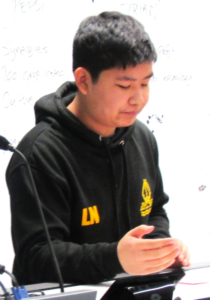
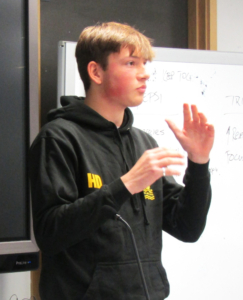
Lewis Henry
Henry’s summary speech was the first in the whole debate to compare the benefits and harms of short form content, as he explained why the danger of tweets and short videos subtly influencing users outweighs the benefit of increased awareness. He made a very good job of linking all the arguments for the motion with the two points of clash that he had identified. Kashan also produced an effective summary speech, arguing that the harms identified by his opponents were no less prevalent in other social media and emphasising the importance of J J’s contribution to the case against the motion. The judge awarded second place to Henry & Lewis, behind a very strong team, with Kashan & J J third.
Fortified by lunchtime pizza, speakers tackled the idea that, to combat climate change, the environmental movement should advocate for geo-engineering rather than attempting to lower CO2 emissions. J J & Kashan found themselves closing the case for the motion, in a very tough room with two teams from St Paul’s Girls and one from Dulwich,. Unfortunately, all the best arguments on their side had already been well expressed and, despite their best efforts, their speeches were less impressive and they could only manage fourth place.
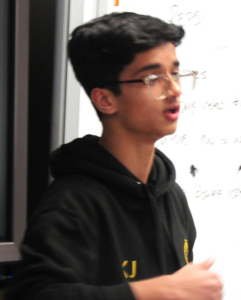
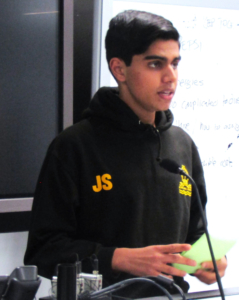
Kashan JJ
Meanwhile, Lewis & Henry, speaking first for the Opposition, gained another pleasing second place. For the last round, they were then unlucky to be drawn against three teams ranked higher than them, with the added difficulty of being drawn in the ‘bottom half’ of the debate, opposing “This House Regrets the memeification of mental health”. Lewis rightly attacked his opponents for characterising all memes as attempts to denigrate people and stressed the value of humour as a coping mechanism. Summarising, Henry identified the key themes of the debate – the nature & purpose of memes and their capacity to raise awareness of issues in a sympathetic manner. However, they were placed fourth, with the winning team achieving seventh place in the overall standings. Despite having to close yet another debate, Kashan & J J were rewarded with their best result of the day, second place, ahead of teams from Dulwich & Latymer Upper.
This earned them 43rd place overall, just one team point behind Henry & Lewis, who finished 36th.Throughout the day, both TBSHS teams demonstrated great resilience and a very positive attitude and these results, in such a high-quality field, do them great credit.
Congratulations and many thanks to all our competition debaters for giving up their time and maintaining the school’s excellent interschool reputation.
A.D. Fraser

